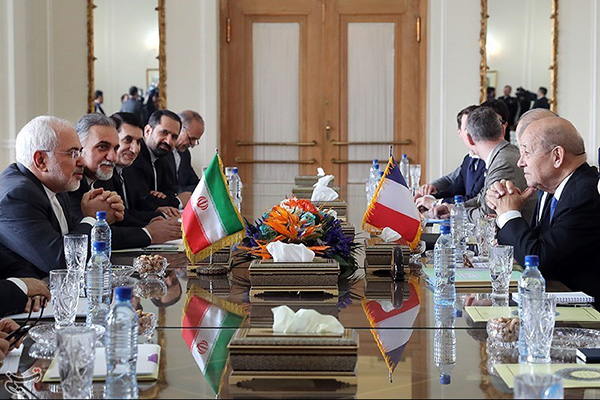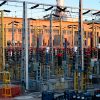The US re-imposition of sanctions against Iran on 4 November 2018 prompted vociferous official protests from its European allies, particularly France, Germany and the UK, who remain signatories to the Iran Nuclear Deal . Among these so-called E-3 nations, France positioned itself as the leader of the European opposition to the new US position towards Iran. Despite the initial defiant tone from Paris and its advocacy for an alternative financial mechanism to evade sanctions, France has not acted to undermine the US objective of bringing economic pressure to bear on Tehran by limiting the revenue-earning capacity of Iran’s oil and natural gas industries. France’s actions indicate that the E-3’s implementation of the INSTEX alternative trade channel to Iran will, likewise, not be used to thwart US policy towards Iran, at least not at the outset.
“France’s actions indicate that the E-3’s implementation of the INSTEX alternative trade channel to Iran will, likewise, not be used to thwart US policy towards Iran, at least not at the outset”.
The re-imposition of sanctions resulted from US President Donald Trump’s 8 May 2018 withdrawal from the Iran Nuclear Deal. Formally known as the Joint Comprehensive Plan of Action (JCPOA), the 2015 agreement between Iran and the P5+1 nations (the permanent members of the UN Security Council plus Germany) exchanged a reduction in international sanctions on Iran for Tehran limiting its nuclear development programme. The Trump Administration’s renewed sanctions target Iran’s petroleum and shipping industries and place limits on financial transactions with the aim of crippling the country’s oil and natural gas exports.
Among the E-3 nations, France’s response was the most openly adversarial. ‘Europe refuses to allow the US to be the trade policeman of the world’, declared France’s Minister of Economy and Finance Bruno Le Maire in response to the new sanctions regime. Vowing to protect the EU’s ‘economic sovereign’, Le Maire threatened to make the EU’s currency, the euro, as strong as the US dollar, starting with the creation of a Special Purpose Vehicle, an alternative trade channel to the SWIFT system that would be immune to US scrutiny.
Despite the strident tone from the French government, French firms have been forced to comply with the new US sanctions against Iran’s energy sector, since Washington refused to grant France a sanctions compliance waiver such as it had given to eight other nations. As a result, France’s largest energy company, Total, was forced to withdraw from a US$4.8 billion development project in Iran’s massive South Pars natural gas field. Total is highly vulnerable to punitive action under the US sanctions as 90% of its financing operations involve US banks and the company also maintains US$10 billion in capital in US assets. Total, Europe’s largest refiner, did not seek a waiver to continue crude oil purchases from Iran and France’s Iranian oil imports had already ceased in September 2018 anticipating the new sanctions. While France constituted only 6.3% of Iran’s 2017 export market, the loss of French purchases will represent a US$2-3 billion annual revenue shortfall for Iran, if the Islamic Republic cannot find an alternative buyer under the new sanctions regime.
Like the cessation of French oil imports from Iran, French car manufacturers in Iran have suspended their operations. Following the initial defiant tone emanating from Paris, Renault’s then CEO Carlos Ghosn vowed in June 2018 to defy US sanctions and maintain its operations in Iran. One month later, Renault reversed its decision, following its French rival PSA Group, manufacturer of Peugeot and Citroen, which had already suspended its operations in Iran.
“Despite its rhetorical position as the leader of the Western opposition to the Trump Administration’s policies toward Iran, France’s Iran policy orientation has remained largely in line with US objectives”.
In light of these emerging realities, in the run-up to the new sanctions regime the French President Emmanuel Macron struck a more conciliatory tone about the re-imposition of sanctions on Iran during his September 2018 address to the UN, suggesting that US economic pressure on Iran combined with the continued EU engagement with the country would serve to limit Tehran’s military capabilities while preserving the power of the reformist elements in the Iranian government. Speaking to reporters, the more circumspect Macron explained that ‘Perhaps because we’re able to keep this multilateral framework [the JCPOA], avoid the worst and act as a mediator, while the US sanctions create pressure and reduce the amount of money available for Iran’s expansionism, that can accelerate the process we want’.
France’s attitude has also been moderated by the discovery of Iranian covert operations on French soil. On 2 October 2018, France publicly accused Iran of being behind the failed plot to bomb a 30 June 2010 rally near Paris organised by the exiled opposition group, the National Council of Iran. The Macron government eventually expelled an Iranian diplomat allegedly linked to the plot.
In addition, France has also looked askance upon Iran’s efforts to enhance its long-range missile capability. Condemning a failed Iranian satellite launch that allegedly employed technology applicable to ballistic missiles, Paris threatened Tehran with sanctions if it does not reign in its missile development programme. Declaring on 16 January 2018 that ‘The Iranian ballistic programme is a source of concern for the international community and France’, the French Foreign Ministry issued a formal appeal to Iran to cease its testing: ‘We call on Iran not to proceed with new ballistic missile tests designed to be able to carry nuclear weapons, including space launchers, and urge Iran to respect its obligations under all UN Security Council resolutions’.
UN Security CouncilResolution 2331 formally enshrines the terms of the JCPOA that includes a call upon Iran to refrain for eight years from developing ballistic missiles capable of delivering nuclear weapons. In a response to criticism from France and other Western nations over the satellite launch, Iran’s then Foreign Ministry spokesman Bahrem Qasemi claimed ‘Such (space) capabilities have civilian nature and are by no means in violation of any of the international regulations in this area’.
France’s exhortation came a week after talks in Tehran between Iranian diplomats and envoys from the E-3 nations as well as from Denmark, the Netherlands and Belgium resulted in the Iranian side storming out of the meeting. In response, the EU imposed its first sanctions on Iran since 2015. Although largely symbolic, the measure was designed to send a clear signal to Tehran about EU member states’ concerns over both the missile programme and Iranian operations on European soil. On 25 January the French Foreign Minister, Jean-Yves Le Drian, a prominent advocate for an alternative EU-Iran trade channel, threatened Tehran with more significant sanctions if the negotiations on Iran’s ballistic missile programme makes no progress. In response to Le Drian’s remarks, Qasemi firmly stated, ‘Iran’s missile capability is not negotiable, and this has been brought to the attention of the French side during the ongoing political dialogue between Iran and France’.
“The use of INSTEX for the sale of humanitarian items will not undermine US goals”.
Iran apparently was able mollify Paris’s concerns, aided by its Deputy Foreign Minister Seyed Abbas Araghchi’s 4 February 2018 meeting with the Secretary-General of France’s Ministry of Foreign Affairs, Maurice Gourdault-Montagne. The February meeting in Paris was the first of the two biannual ministerial-level meetings established to improve bilateral relations between France and Iran. As a result of the progress in relations, France appointed Phillipe Thiebaud its new Ambassador to Iran on 6 March, followed two days later by Iran’s appointment of Bahrem Qasemi as its own Ambassador to France.
Iran’s undisclosed accommodation of France’s concerns seems to be tied to the E-3’s creation of the new payments channel, the Instrument for Supporting Trade Exchanges (INSTEX), based in Paris to enable European businesses to conduct financial transactions with Iran without US scrutiny. Although the details have not been made public, the system involves parallel payments within a particular EU state and within Iran. On 15 March 2018 the head of the Central Bank of Iran announced the creation of the Special Trade and Finance Institute (STFI) in Tehran to operate in parallel with INSTEX, following the 12 March meeting between E-3 representatives for INSTEX and their Iranian counterparts in Tehran.
To Tehran’s chagrin, France and the other two E-3 partners have made the operation of INSTEX contingent upon progress in the negotiations on Iran’s missile programme and Iran joining the Financial Action Task Force (FATF) designed to stop money laundering and terrorist financing. Ayatollah Sadeq Amoli Larijani, the Chairman of Iran’s powerful Expediency Discernment Council, described the terms as ‘denigrating conditions’. Furthermore, the E-3 has also said that INSTEX will be used only for Iranian purchases of food, medicine and medical equipment, and is holding out the possibility for wider use of the trade channel as an incentive for increased cooperation from Tehran.
The use of INSTEX for the sale of humanitarian items will not undermine US goals. While France and the other two E-3 nations continue to uphold the JCPOA, their lack of investment in the development of Iran’s oil and natural gas industries means that Iran will have a hard time maintaining its oil production and satisfy an increasing demand for natural gas and petrochemicals. Iran will not see the financial dividends that it had anticipated when entering into the deal. With insufficient oil, gas and petrochemical revenues, Iran’s economy will become increasingly fragile. The Iranian government’s predicament of needing to satisfy domestic consumer demands while simultaneously financing bloated state and military institutions could result in an economic collapse and therefore induce Tehran to return to the negotiating table.
Despite its rhetorical position as the leader of the Western opposition to the Trump Administration’s policies toward Iran, France’s Iran policy orientation has remained largely in line with US objectives. Until France and its two E-3 partners decide to use INSTEX as a channel for investments in Iran’s oil and gas sectors, US sanctions will continue to exert increasing economic pressure on Tehran. The recent history of France’s Iran policy indicates that INSTEX will not be used to undermine US sanction in the near future.



